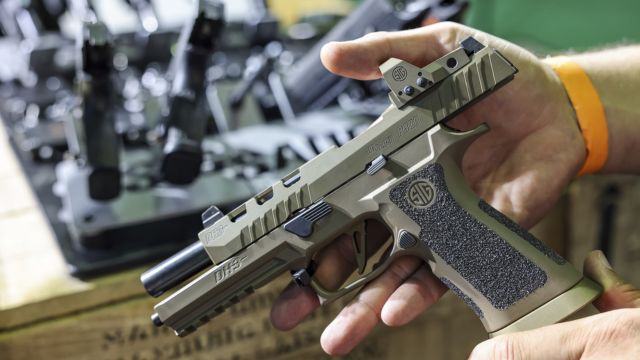As worries about the Sig Sauer P320 handgun’s safety grow, more and more police departments across the US are rethinking how they use this famous semiautomatic firearm.
More than 2.5 million Sig Sauer P320s have been sold since it came out in 2014. It is now one of the most famous guns in the United States. Since 2017, the P320 has also been the standard sidearm for the U.S. forces.
But the gun has been linked to several accidental firings.
The P320 is no longer allowed in any of the training sites run by the Washington State Criminal Justice Training Commission. Police and prison guards in the state can get training from this organization.
The decision was made after a four-month review that was started by an event last year in which a police recruit’s P320 went off while it was being drawn, hurting both an instructor and another recruit.
“The WSCJTC’s only concern in this process is keeping its recruits and instructors safe while they learn and work,” the report from the agency says.
According to a 2023 investigation by The Trace, a news organization that covers gun violence, and The Washington Post, this incident is part of a larger pattern of complaints from more than 100 people who have had similar problems with the gun since it came out. At least 80 injuries were linked to accidental discharges.
Since the investigation in 2023, at least 15 more people have sued Sig Sauer, and new evidence has come to light linking the gun to at least one death and 20 more injuries, The Trace revealed in December.
Several police departments, including those in Alabama, Connecticut, Florida, Texas, Washington, and Wisconsin, have not carried the P320 since at least 2017. These include the Milwaukee Police Department, the Dallas Police Department, and the SEPTA transit police in Philadelphia. Other states also have similar policies.
In June, a jury in Georgia found Sig Sauer responsible for a flaw in its P320 pistol and gave the plaintiff $2.35 million because their gun went off while it was in its holster. Court records show that the bullet went through the plaintiff’s right upper leg and came out just above his knee.
The Trace noted in June that this was the first time a jury had said that the handgun was badly made.
In November, a jury in Philadelphia gave $11 million to an injured Army soldier whose P320 went off while it was in his pocket. The veterans were hurt because the gun did not have an external safety like Glocks and other handguns do. The jury decided that Sig Sauer was responsible for this reason.
Most of the time, external safeties keep a gun’s trigger from going backward when it is dropped or when pressure is put on it indirectly, like from a holster.
In December, a citizen from Oklahoma also asked the 10th U.S. Circuit Court of Appeals to bring back his lawsuit against Sig Sauer because his P320 had fired while it was in his holster in 2018.
A study from the U.S. Department of Defense in 2018—a year after the U.S. Army announced its 10-year, $580 million deal with Sig Sauer—showed that the P320 could fire without pulling the trigger if dropped at certain angles. In 2017, Sig Sauer changed the way the gun’s trigger worked. The company also changed the civilian form of the P320 and let owners of older models return them voluntarily so that they could get new parts.
Even though there have been more reports of problems, Sig Sauer has always said that the P320 is safe to use. The company has denied that the gun is broken and says that the reported fires are because the gun was not handled properly.
“The P320 is trusted by the U.S. Military, law enforcement, and responsible people all over the world.” “SIG SAUER is very proud of our great safety record and high-quality guns,” Samantha Piatt, the communications director for the company, said in a statement that was put on its website last year.









